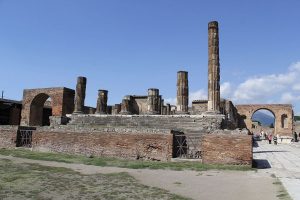Roman Religion Outside of the House

At the beginning of my project I asked the question: How does Roman religion affect daily life? We decided to demonstrate the religious practices in the house by building a model Roman house. In my associate’s blog post, She talks about the process of making our model, and in my other group partner’s post, she gives us a tour of the model house. In my blog post I will be describing gods/goddesses and rituals that were outside of the house. If you want to read about rituals inside the house: Gods and Goddesses Inside the RomanHouse.
Outside of the rituals performed inside of the house, roman religion played a big roll. Rituals were very important and insured success in life, business, and was important to all jobs. The main concept of religion was do ut des (meaning: I give so that you give). One way that Romans worshipped gods were at festivals. The festivals took place outside of the particular god’s temple. At the festivals, there were many rituals performed to appease the gods, as well as feasts. The most popular of these festivals was the Saturnalia. Others included Matronalia, Lupercalia, Veneralia, Parentalia, and Fornacalia. 
The Saturnalia was a festival honoring Saturn, the god of generation, dissolution, plenty, wealth, agriculture, periodic renewal and liberation. The festival was held over winter solstice, however, the event actually started on December 17 and lasted seven days. Saturnalia was held in the Roman Forum. Women were not allowed into the festival on the first day, but, slaves were. Slaves often swapped places with their masters, in result, Saturnalia was given the nickname of feriae servorum (meaning: the slave’s holiday).
The Roman Pantheon was a Roman temple and a place of worship. In roman religion, there were many gods, some more respected and useful than others. There were two triads of gods that were looked highly upon. The Archaic Triad was the first, it consisted of Jupiter, Mars, and Quirinus, and the second triad: Capitoline. The second trio had Jupiter but replaced the other two gods with Juno and Minerva.
 Jupiter was the king of gods, and god of the weather and sky. He was compared to the greek god Zeus, and the Egyptian god Amon. His temple was on Aventine hill. Mars was the Roman god of war and agriculture, he was extremely important, much more than his greek counterpart Ares. Mars was parised before and after wars for luck and gratitude. Being the god of agriculture, he had many festivals that honored him in the month of March. The last Archaic god was Quirinus. Little is known about this war god. Historians belief that he existed long before the birth of Rome.
Jupiter was the king of gods, and god of the weather and sky. He was compared to the greek god Zeus, and the Egyptian god Amon. His temple was on Aventine hill. Mars was the Roman god of war and agriculture, he was extremely important, much more than his greek counterpart Ares. Mars was parised before and after wars for luck and gratitude. Being the god of agriculture, he had many festivals that honored him in the month of March. The last Archaic god was Quirinus. Little is known about this war god. Historians belief that he existed long before the birth of Rome.
The Capitoline triad was viewed as more important and more recent. Many believed that the three gods were the most important for Rome. Jupiter was the first god, and his wife was also in the trio, Juno. Juno was associated with the greek god Hera. The goddess was linked the birth and marriage and was important to Roman woman. Therefore, the festival of Matronalia was held in her honor. Juno was referred to as queen of the gods because she married Jupiter. Minerva was the last of the Capitoline triad. She was associated with Athena, which linked her to war, but her connection with the mind and intelligence were more important to Romans. She was sometimes seen as Jupiter’s consort instead of Juno. She surpassed Mars as the most important military figure.
There were countless amounts of other gods that were worshiped besides the two trios. They were just viewed as less important. Some of those gods and goddesses are listed as follows:
- Janus, the god of beginnings
- Saturn, an agriculture god
- Vulcan, the god of fire and the forge
- Venus, the goddess of fertility
- Mercury, the god of communication
- Diana, associated with the moon and the woods
- Ceres, a grain goddess
- Isis, the egyptian goddess of feminine power
- Apollo, associated with poetry and much more
- Bacchus, the god of wine
Roman Religion is a very vast topic with lots to learn. There were many ways that Romans worshiped their gods including temples and festivals. Gods/Goddesses were both important inside and outside of the house, they insured success in life. You can visit the process of our roman house model here, and the tour here. My other group member talks about religion in the Roman house.
Works Cited
Aldrete, Gregory S. “Roman Forum.” ABC-CLIO eBook Collection, ABC-CLIO, ancienthistory.abc-clio.com/
Search/Display/1820836?terms=Roman+forum&sType=quick. Accessed 24 May 2018.
Dixon-Kennedy, Mike. “Saturn.” ABC-CLIO eBook Collection, ABC-CLIO, ancienthistory.abc-clio.com/
Search/Display/
587100?terms=Roman%20religion&webSiteCode=SLN_HANC&returnToPage=%2fSearch%2fDisplay%2f587100%3fterms%
3dRoman+religion&token=6FF968CAFF21102ED3FECFA1EE38C50B&casError=False. Accessed 24 Mar. 2018.
McGeough, Kevin Murray. “Roman Pantheon.” ABC-CLIO eBook Collection, ABC-CLIO,
ancienthistory.abc-clio.com/Search/Display/1603346?terms=roman+gods&sType=quick. Accessed 29
May 2018.
Pope, Stephanie M. Cambridge Latin Course Unit 3. Illustrated by Peter Kesteven, Cambridge UP, 1971.
Roy, Christian. “Saturnalia.” ABC-CLIO eBook Collection, ABC-Clio, ancienthistory.abc-clio.com/
Search/Display/1699004?terms=saturn. Accessed 24 May 2018.
“Saturn.” Wikipedia, en.wikipedia.org/wiki/Saturn_(mythology). Accessed 1 June 2018.
“Saturnalia.” Wikipedia, en.wikipedia.org/wiki/Saturnalia. Accessed 1 June 2018.
“Temple of Jupiter.” Encircle Photos, www.encirclephotos.com/image/
temple-of-jupiter-at-forum-in-pompeii-italy/. Accessed 1 June 2018.
Tschen-Emmons, James B. “Roman Religion.” ABC-CLIO eBook Collection, ancienthistory.abc-clio.com/
Search/Display/
583696?terms=Roman%20religion&webSiteCode=SLN_HANC&returnToPage=%2fSearch%2fDisplay%2f583696%3fterms%
3dRoman+religion&sType=quick&token=3E0FBD19D8C6740F84E436EF2037D6FA&casError=False. Accessed 21
5 2018.
—. “Rome.” ABC-CLIO eBook Collection, ABC-CLIO, ancienthistory.abc-clio.com/Search/Display/
583723?terms=roman%20gods&webSiteCode=SLN_HANC&returnToPage=%2fSearch%2fDisplay%2f583723%3fterms%3dro
man+gods&token=08E5917376564BDAD24CDF9A6A547808&casError=False. Accessed 30 May 2018.
(Work cited: 227 words)
